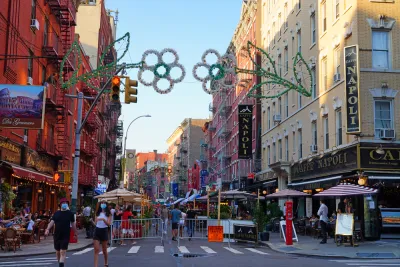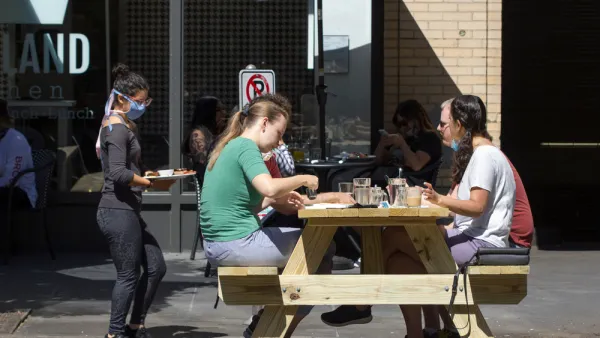The latest installment of Planetizen's ongoing effort to track the stories about the future of planning in a world forever changed by COVID-19 notices a recurring theme.

Members of the media apparently spent their summers doubling down on the themes that have dominated the discourse since the beginning of the pandemic. This newest installment of a series of compendiums of news, commentary, opinion, and analysis on the future direction of cities and communities as a result of the pandemic trends heavily toward articles predicting (or at least implying) a historically unprecedented collapse of demand for urban living in the United States.
The question of whether the nation's largest cities are currently undergoing a period of exodus only paralleled by the white flight of the 20th century is not the only theme organizing this particular compendium, though the preference among the media outlets of the United States for stories about wealthy white people leaving urban areas like New York City, Washington, D.C., and San Francisco, and adopting hometowns of more suburban or even rural character, is obvious. You might be forgiven for wondering if the sheer number of articles on this theme in past six months might reflect the conflicted interests of real estate agents and media publishers more than, say, scientifically conclusive data.
Planetizen has been documenting the ongoing debate about the future of urbanism, planning, transportation, etc., throughout the pandemic, so far sharing four previous compendiums of articles on the subject, with many more examples mixed in over the course of the year.
- The Great Debate: Will the Pandemic Alter the Course of Urbanism? (July 2020)
- Debating the Future of Cities After the Coronavirus, Volume 3 (June 2020)
- Density Debate Rages Alongside the Pandemic (April 2020)
- Debating the Future of Cities, and Urban Density, After the Pandemic (March 2020)
- Coronavirus and Urbanism (Planetizen Tag)
- Coronavirus and Transportation (Planetizen Tag)
- Coronavirus and Density (Planetizen Tag)
This entire issue of the compendium could have been devoted to stories about the decline of urban lifestyles, so let's start there.
The Inevitable Urban Exodus
These articles just cannot avoid coming the conclusion that the coronavirus pandemic has set cities on a path of inevitable decline. Sometimes the commentators seem almost giddy about the prospect. This section includes an appearance by James Howard Kunstler, with the American Conservative article linked below.
- Builders see Maryland project as future of telecommuting, post-pandemic housing (The Washington Post, August 7, 2020)
- Leaving New York: How to Choose the Right Suburb (The New York Times, August 7, 2020)
- New York and San Francisco Can’t Assume They’ll Bounce Back (Bloomberg, August 10, 2020)
- People are ditching Houston for 'green pastures' because of city's COVID surge (Houston Chronicle, August 10, 2020)
- NYC Is Dead Forever, Here's Why (James Altucher on LinkedIn, August 13, 2020)
- The Rise of Work-From-Home Towns (Bloomberg, August 27, 2020)
- New Yorkers Are Fleeing to the Suburbs: ‘The Demand Is Insane’ (The New York Times, August 30, 2020)
- A move-in day like no other: Tenants have a rare upper hand as apartments sit empty (The Boston Globe, August 30, 2020)
- The Age Of The Mega-City Is Over (The American Conservative, August 31, 2020)
- Real Estate Is Now About Location, Location, Isolation (Wall Street Journal, September 1, 2020)
- People desperate for more space fuel a pandemic real estate boom (The Washington Post, September 1, 2020)
Counterpoints
It has to be said that data proving the central conceit of most of the preceding articles is far outpaced by anecdotes from sources with glaring conflicts of interest (imagine a suburban real estate agent without a story to tell the New York Times or The Washington Post). To those who love cities, like Jerry Seinfeld for example, the idea that big cities are canceled is begging to be refuted.
- Can this be the end of "end of cities," please? (Shutdown Corners, July 30, 2020)
- When It Comes to Covid-19, Density Doesn’t Kill—Sprawl Does (Common Edge, August 3, 2020)
- Zillow 2020 Urban-Suburban Market Report (Zillow, August 12, 2020)
- Want to Flee the City for Suburbia? Think Again (The New York Times, August 17, 2020)
- New York Is Gone Forever (According to Me, a Baby With No Object Permanence) (McSweeney's, August 21, 2020)
- Jerry Seinfeld: So You Think New York Is ‘Dead’ (The New York Times, August 24, 2020)
- No, the Pandemic Is Not Emptying Out America’s Cities (Curbed, August 31, 2020)
Business Unusual
There's no interest in finding clues about the future direction of the pandemic and its outcomes like commercial interest.
- Home working trend could 'revive the High Street' (BBC, July 30, 2020)
- Shut down by the coronavirus, Philadelphia’s convention center prepares to reopen (The Philadelphia Inquirer, August 4, 2020)
- Covid-19 upended the office, but it might have created something better (Quartz, August 9, 2020)
- Pandemic May Deliver Final Blow to Struggling Malls (Globe St., August 19, 2020)
- Sears and Kmart stores are up for grabs across California. But who wants all that space? (Los Angeles Times, August 28, 2020)
- Goodbye to the ‘Pret economy’ and good luck to whatever replaces it (Financial Times, August 31, 2020)
- Remote Work Is Killing the Hidden Trillion-Dollar Office Economy (The Marker via Medium, September 1, 2020)
Mobility Makeover
Since the beginning of the pandemic, conflicting narratives about cratering ridership revenues sinking public transit systems, a sudden rush to buy new cars and switch to single-occupant commutes, a rise in popularity for walking and biking, and the dawn of the long-promised remote working era, have created one of the biggest looming uncertainties of the pandemic: Will the changes to travel patterns during the pandemic forever alter the evolution of mobility in cities, where innovation and disruption was a pre-coronavirus condition?
- In Covid-19 Recovery, London Bets Big on Low Traffic (Bloomberg CityLab, July 28, 2020)
- Top Mayors Pledge to Build 15-Minute Cities For COVID-19 Recovery (Streetsblog USA, July 31, 2020)
- Coronavirus Accelerates Plans to Put Urban Commuters on Bicycles (The Wall Street Journal, July 31, 2020)
- How to Stay Safer on Mass Transit (The New York Times, August 1, 2020)
- From Metro funding crisis to telework’s rise, transportation is in historic turmoil (The Washington Post, August 10, 2020)
- Private bus firms close doors as pleas for aid go unanswered (The Seattle Times, August 20, 2020)
- COVID-19 derails plans to address state funding for PennDOT, transit agencies (Pittsburgh Post-Gazette, August 23, 2020)
- Public transit faces 'death spiral' without $32bn injection from Congress (The Guardian, August 30, 2020)
- Americans are saving more than just money by not commuting (CNN, September 1, 2020)
- NACTO selects 10 cities for pandemic street design grants (Smart Cities Dive, September 1, 2020)
Predictions and Predilections
Some of us are still building a framework of understanding of the changes underway and changes yet to come. But it's the job of planners and designers to anticipate and predict the future, and here we see that hard work already underway.
- How Will the Pandemic Impact the Built Environment? (The Dirt, June 30, 2020)
- Tracing the Invisible Danger of Household Crowding (Bloomberg CityLab, July 21, 2020)
- How might DC rethink urban living after COVID-19? (Greater Greater Washington, August 7, 2020)
- Column: Meet the secret weapon for fighting the pandemic: Interior architects (Chicago Tribune, August 28, 2020)
- Is Staying In Staying Safe? (The New Yorker, August 31, 2020)
The Ugly Politics of Pandemic Urbanism
The Trump administration has spent the past month telegraphing its campaign strategy of leveraging the uncertainty of communities during the pandemic to further drive a wedge between the collective interests of all the communities that reside in the United States. The effort to politicize suburban lifestyles and fundamental questions of planning governance is being led by Trump himself, along with U.S. Department of Housing and Urban Development Secretary Ben Carson, who recently signed their names to an opinion piece published by The Wall Street Journal, linked below.
In a month when Trump was routinely criticized for inciting disagreement and violent conflict, the president's words about his desire to protect the suburbs from liberal policies, in context of the uncertainty and anxiety of the pandemic, don't bode well for the productivity of future debates about the role of the built environment in shaping U.S. communities.
- Why Trump’s Blunt Appeals to Suburban Voters May Not Work (The New York Times, July 31, 2020)
- We’ll Protect America’s Suburbs (The Wall Street Journal, August 16, 2020)
- Trump says Biden would 'destroy the suburbs.' What is he talking about? (The Boston Globe, August 17, 2020)
- How Ben Carson Tried to Destroy Fair And Affordable Housing (Curbed, August 17, 2020)
- Trump is clinging to an outdated vision of America’s suburbs (Brookings, August 20, 2020)
- Zoning Reform Is Not Leftism (The American Conservative, August 21, 2020)

National Parks Layoffs Will Cause Communities to Lose Billions
Thousands of essential park workers were laid off this week, just before the busy spring break season.

Retro-silient?: America’s First “Eco-burb,” The Woodlands Turns 50
A master-planned community north of Houston offers lessons on green infrastructure and resilient design, but falls short of its founder’s lofty affordability and walkability goals.

Delivering for America Plan Will Downgrade Mail Service in at Least 49.5 Percent of Zip Codes
Republican and Democrat lawmakers criticize the plan for its disproportionate negative impact on rural communities.

Test News Post 1
This is a summary

Test News Headline 46
Test for the image on the front page.

Balancing Bombs and Butterflies: How the National Guard Protects a Rare Species
The National Guard at Fort Indiantown Gap uses GIS technology and land management strategies to balance military training with conservation efforts, ensuring the survival of the rare eastern regal fritillary butterfly.
Urban Design for Planners 1: Software Tools
This six-course series explores essential urban design concepts using open source software and equips planners with the tools they need to participate fully in the urban design process.
Planning for Universal Design
Learn the tools for implementing Universal Design in planning regulations.
EMC Planning Group, Inc.
Planetizen
Planetizen
Mpact (formerly Rail~Volution)
Great Falls Development Authority, Inc.
HUDs Office of Policy Development and Research
NYU Wagner Graduate School of Public Service





























